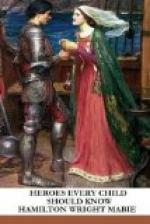They had worked and thought and dreamed only a little time before they began to explain the marvelous earth on which they found themselves and the strange things that happened in it; the vastness and beauty of the fields, woods, sky and sea, the force of the wind, the coming and going of the day and night, the warmth of summer when everything grew, and the cold of winter when everything died, the rush of the storm and the terrible brightness of the lightning. They had no idea of what we call law or force; they could not think of anything being moved or any noise being made unless there was some one like themselves to move things and make sounds; and so they made stories of gods and giants and heroes and nymphs and fawns; and the myths, which are poetic explanations of the world and of the life of men in it, came into being.
But they did not stop with these great matters; they began to tell stories about themselves and the things they wanted to do and the kind of life they wanted to lead. They wanted ease, power, wealth, happiness, freedom; so they created genii, built palaces, made magic carpets which carried them to the ends of the earth and horses with wings which bore them through the air, peopled the woods and fields with friendly, frolicsome or mischievous little people, who made fires for them if they were friendly, or milked cows, overturned bowls, broke dishes and played all kinds of antics and made all sorts of trouble if they were mischievous or unfriendly. Beside the great myths, like wild flowers in the shade of great trees, there sprang up among the people of almost all countries a host of poetic, satirical, humorous or homely stories of fairies, genii, trolls, giants, dwarfs, imps, and queer creatures of all kinds; so that to the children of two hundred years ago the woods, the fields, the solitary and quiet places everywhere, were full of folk who kept out of sight, but who had a great deal to do with the fortunes and fates of men and women.
From very early times great honor was paid to courage and strength; qualities which won success and impressed the imagination in primitive not less than in highly developed societies. The first heroes were gods or demi-gods, or men of immense strength who did difficult things. When men first began to live in the world they were in constant peril and faced hardships of every kind; and from the start they had very hard work to do. There were fields to be cultivated, houses to be built, woods to be explored, beasts to be killed and other beasts to be tamed and set to work. There were many things to be done and no tools to work with; there were great storms to be faced and no houses for protection; there was terrible cold and no fire or clothing; there were diseases and no medicine; there were perils on land, in the water and in the air, and no knowledge of the ways of meeting them.




